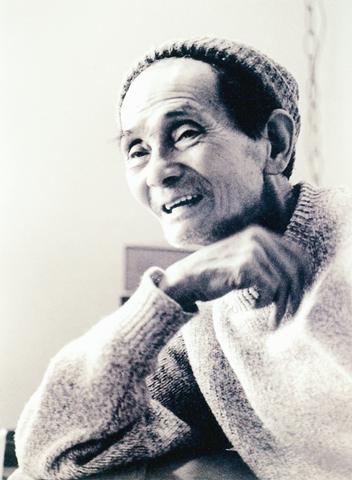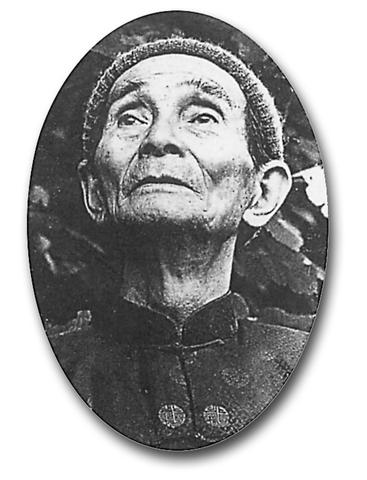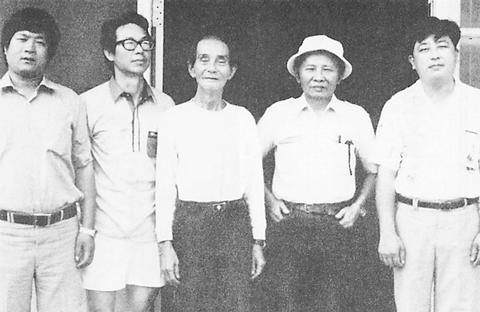Taiwanese author Yang Kui (
Years later he would wryly remark that he "is the best-rewarded writer in the history of Taiwan, averaging a five-day jail term per word."

PHOTO COURTESY OF THE NATIONAL CULTURAL HERITAGE PRESERVATION RE
According to the prominent Hakka writer Chung Chau-cheng (

Chung said Yang not only expressed his opposition to repressive Japanese colonial rule, but was also motivated by a strong sense of class-consciousness, which greatly enlightened writers of subsequent generations.
Born into a tinsmith's family in Tainan, Yang witnessed the 1915 Tapani Massacre by the Japanese (

PHOTO: COURTESY OF AVANT GRADE PUBLISHING CO
As a teenager, Yang was interested in Japanese, Russian and Western realist literature, such as Victor Hugo's Les Miserables, and became engrossed in their themes of humanism.
He fled to Japan in 1924 to escape an arranged marriage and there continued his studies. While in Japan, Yang was deeply impressed by the mainstream development of socialism.
"Yang was a true believer in Marxism, but not dogmatic. He used his literary works to deal with class and racial issues of his time, vividly expressing his stern opposition to colonialism and imperialism," said Chen Fang-ming (
In Japan, Yang worked his way through college as a newspaper boy and a part-time cement worker -- experiences that would later provide the backdrops to his novels. He was arrested for the first time on a charge of participating in a demonstration, but spent only three days in jail.
In 1927, at the request of farmers' organizations, Yang returned to Taiwan to join forces with them in promoting farmers' movements. Beginning from this time, Yang and his wife Yeh Tao (
Yang was honored in 1934 as the first Taiwanese writer to receive the Literary Criticism Award with his book The Newspaper Boy (
The Newspaper Boy, written in 1932 in Japanese, tells the story of Taiwanese newspaper boys' miserable lives and exploitation at the hands of a Japanese newspaper owner, who is eventually brought down when the workers go on strike for better pay and working conditions. The novel not only was an open rebuke of capitalism, but also centered on class struggle and conflict.
"The confrontation [presented in Yang's work] was not an oversimplified story of disadvantaged Taiwanese and advantaged Japanese. The story was complicated by human nature," said Yang's granddaughter, Yang Tsui (
Yang devoted his youth to farmers' movements in the 1930s and took charge in the movements' organization, earning praise as a pioneer of so-called "committed literature" (參與的文學) in Taiwan, a genre which usually depicts the poverty and misery of the poor and disenfranchised. Yang's strong opposition to capitalism even led him to name his first son Yang Tzu-beng (楊資崩), the son's given name translating as "the collapse of capitalism."
"Yang was not all talk and no action. He used his novels to correct the erroneous history forced on people by their rulers, and, moreover, he exerted his leadership on farmers' organizations," said Lin Juei-min (林瑞明), professor of Taiwanese literature at National Cheng Kung University.
Yang's legacy is simultaneously one of a social activist and of a man of letters.
"Yang's importance in the social movement outweighed that of his literary achievement," said writer Tseng Ching-wen (
Other critics, however, see a literary giant in Yang's writings.
Chen of Chengchi University cites, for example, Yang's masterpiece In Bud (
Yang continued to be as outspoken and radical under KMT rule as he was under Japanese colonial rule, Chen said. He introduced works by China's leftist writer Lu Xun (魯迅) to Taiwan, was highly critical of the KMT's policy to promote Mandarin and even encouraged young people in Taiwan to organize self-defense corps to fight the KMT, all of which could have earned him a death sentence.
To silence him, the KMT tried locking him up. But even that did not work. During his 12-year imprisonment on Green Island (綠島), which began in 1949, Yang wrote letters home, literary works on the jail wall and critiques dubbed "roses that cannot be squelched" (壓不扁的玫瑰).
Yang finished his days at his own Tonghai Garden (
"Yang was a very quiet person. He could read at his desk without uttering a word all day," said Lin, who spent a year with Yang.
Yang's granddaughter described the writer as a typical Taiwanese grandfather, who was at times childlike. "He was a very innocent, romantic and optimistic person, who insisted on distancing himself from power," she said, summing up the man's three driving motivations in life as knowledge, labor and social movements.

Taiwan has next to no political engagement in Myanmar, either with the ruling military junta nor the dozens of armed groups who’ve in the last five years taken over around two-thirds of the nation’s territory in a sprawling, patchwork civil war. But early last month, the leader of one relatively minor Burmese revolutionary faction, General Nerdah Bomya, who is also an alleged war criminal, made a low key visit to Taipei, where he met with a member of President William Lai’s (賴清德) staff, a retired Taiwanese military official and several academics. “I feel like Taiwan is a good example of

March 2 to March 8 Gunfire rang out along the shore of the frontline island of Lieyu (烈嶼) on a foggy afternoon on March 7, 1987. By the time it was over, about 20 unarmed Vietnamese refugees — men, women, elderly and children — were dead. They were hastily buried, followed by decades of silence. Months later, opposition politicians and journalists tried to uncover what had happened, but conflicting accounts only deepened the confusion. One version suggested that government troops had mistakenly killed their own operatives attempting to return home from Vietnam. The military maintained that the

Before the last section of the round-the-island railway was electrified, one old blue train still chugged back and forth between Pingtung County’s Fangliao (枋寮) and Taitung (台東) stations once a day. It was so slow, was so hot (it had no air conditioning) and covered such a short distance, that the low fare still failed to attract many riders. This relic of the past was finally retired when the South Link Line was fully electrified on Dec. 23, 2020. A wave of nostalgia surrounded the termination of the Ordinary Train service, as these train carriages had been in use for decades

Lori Sepich smoked for years and sometimes skipped taking her blood pressure medicine. But she never thought she’d have a heart attack. The possibility “just wasn’t registering with me,” said the 64-year-old from Memphis, Tennessee, who suffered two of them 13 years apart. She’s far from alone. More than 60 million women in the US live with cardiovascular disease, which includes heart disease as well as stroke, heart failure and atrial fibrillation. And despite the myth that heart attacks mostly strike men, women are vulnerable too. Overall in the US, 1 in 5 women dies of cardiovascular disease each year, 37,000 of them